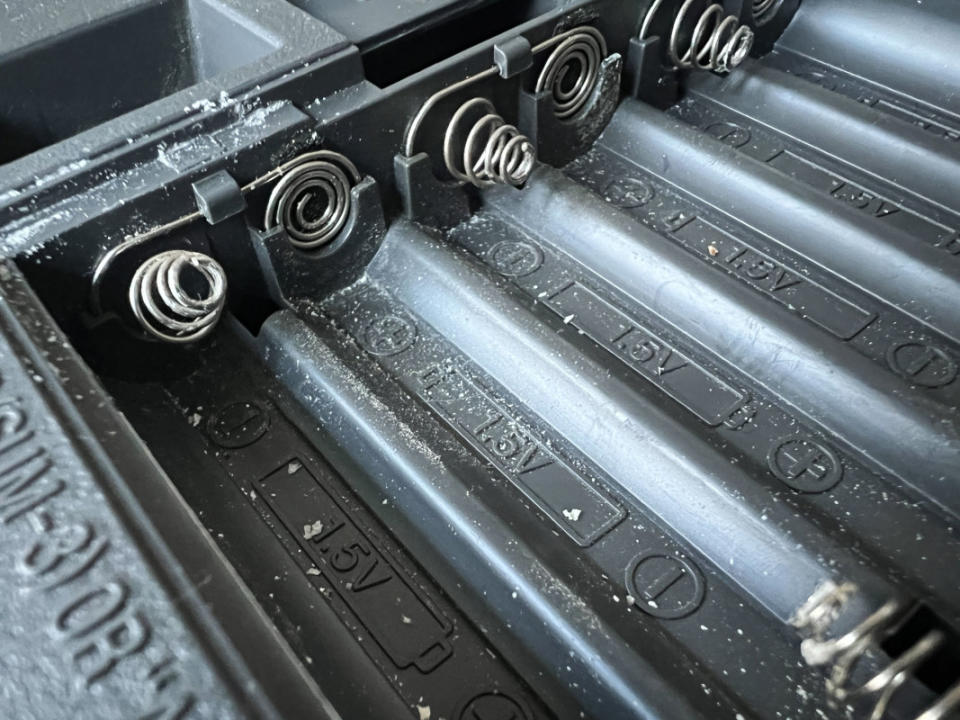How to Clean Battery Corrosion Inside a Battery Case
What's that powdery, crystallized stuff inside your battery case? Classic battery corrosion. While it can be a frustrating and potentially dangerous matter to resolve, it isn't usually hard to clean up. Battery corrosion occurs when old alkaline batteries leak acid inside their case, and since many electronic devices don't require regular battery replacements (we're looking at you, remote controls). Not only does it cause damage to the battery and the device it powers, but it needs to be handled properly.
How to Clean Battery Corrosion the Safe Way
You'll use:
Water
Baking soda
White vinegar
Cotton swab or toothbrush
Paper towels or clean cloth
Pencil eraser
Safety first. Before starting, remember that corrosion is caused by battery acid which can irritate skin and be harmful to inhale. Wear protective gloves at a minimum, and potentially a N-95 mask if you aren't in a well-ventilated space.
Remove corroded batteries from devices (and dispose of them safely). Take out the batteries from the device and discard them properly according to local regulations. Batteries are hazardous waste, so throwing them in the garbage is terrible for the environment. If you store the old batteries in a bag and take them to a designated drop-off site, you'll help promote safe cleanup. Many big box stores and grocery stores participate in battery recycling programs for proper disposal and accept corrosive material from customers. Don't hesitate to ask customer service!
Prepare a cleaning solution. Mix a tablespoon of water and a tablespoon of white vinegar with a teaspoon of baking soda to create a cleaning solution.
Apply a small amount of the cleaner to the case. Dip the end of a cotton swab or toothbrush into the cleaning solution. Apply it directly to the corrosion and buildup without oversaturating the area. Gently scrub at the battery terminals and the plastic case to treat and lift the residue. Repeat as necessary by either getting a new cotton swab or cleaning the toothbrush.
Loosen stubborn spots on the battery contacts with a pencil eraser. Gently scratch at the contact points to remove any buildup.
Dry thoroughly. After cleaning, use a dry cloth or paper towel to absorb moisture and wipe away any residual build-up in the battery compartment. You'll want the battery case dry before inserting fresh batteries.

Emily Fazio
Can battery corrosion be harmful?
Battery leakage typically consists of potassium hydroxide, which can cause skin irritation. Inhaling the fumes or ingesting the substance can also be harmful. While it usually presents in old household batteries, battery corrosion forms due to battery defects, too. Hence, it's important to handle it with care and wear protective gear while cleaning anything affected by a leaky battery.
Can Lithium-Ion Batteries Corrode?
Yes, lithium batteries can corrode, too. While they're more resistant compared to other types of batteries, they can still corrode if exposed to factors like moisture, high temperatures, or contaminants. And truly, corrosion can happen with every type of replaceable battery, so be on the lookout.
Related: How to Safely Clean Your Apple AirPods — in 5 Easy Steps
What causes corrosion?
Corroded battery compartments are often caused by a chemical reaction between the electrolyte (usually potassium hydroxide) inside the battery and the metal components, resulting in the formation of corrosive byproducts such as potassium carbonate or potassium hydroxide. Factors like moisture, temperature, and the type of battery container can accelerate corrosion.
How can I prevent battery corrosion?
Start by storing them in a cool, dry place away from moisture and extreme temperatures.
Avoid leaving batteries in devices for extended periods, especially if they're not in use.
Additionally, consider using rechargeable batteries or products from a reputable battery manufacturer, as they may be less prone to leaking and corrosion.
Regularly check and replace as needed to prevent buildup of corrosive substances.
Related: How Do Green Cleaning Products Work? (And, Which Work Best?)

